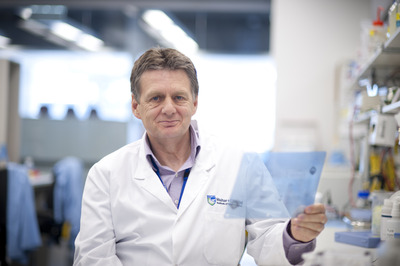2013 Victoria Prize rewards malaria researcher
Malaria researcher Professor Alan Cowman from the Walter and Eliza Hall Institute has been awarded the 2013 Victoria Prize for Science and Innovation in recognition of his outstanding contributions in the quest to eradicate malaria.

The $50,000 Victoria Prize for Science and Innovation in the life sciences recognises Cowman’s career of almost 30 years that has increased our understanding of the malaria parasite, Plasmodium falciparum.
Cowman and his research team have made significant inroads into understanding how the malaria parasite infects humans and persists in the body by evading the immune system.
He has also made major contributions to understanding malarial drug resistance, unravelling the mechanism the parasite uses to become resistant to some of the most important antimalarial drugs. This has had implications for the development of new antimalarial treatments and surveillance of the geographic spread of drug-resistant strains of malaria.
Cowman’s work has led to the development of two potential malaria vaccines, one of which has reached clinical trials in the US and a second of which is in preclinical development.
Cowman said he was honoured to receive the award. “Throughout my career I have been fortunate to work with some incredibly talented researchers and I would like to thank them for their support,” he said. “Science research in Victoria and across the country is world class and I am lucky to be able to facilitate these potentially life-changing discoveries.”
Cowman is a Fellow of the Royal Society and the Australian Academy of Science. He has received numerous national and international grants and fellowships and his many awards include the Howard Taylor Ricketts Medal for Infectious Diseases from the University of Chicago, the Commonwealth of Australia Centenary Medal and the Australian National Heath and Medical Research Council Research Achievement Award.
The Victoria Prize was first awarded in 1998 and celebrates leadership, determination, endeavour and creativity as well as highlighting the many ways in which research and development of international significance are conducted in Victoria.
The University of Sydney formalises cervical cancer elimination partnership
The success of a cervical cancer elimination program has led to the signing of a memorandum of...
Noxopharm says paper reveals science behind its immune system platform
Clinical-stage Australian biotech company Noxopharm Limited says a Nature Immunology...
Neurosensing/neurostimulation implants session to be held on Monday
On Monday, a session at UNSW Sydney will include people who are benefiting from bioelectronics...



